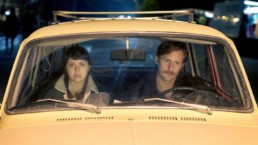Review: ‘The Diary of a Teenage Girl’
The '70s set coming of age story offers emotional and artistic range in a fine pairing of writer/director and lead actor.
Although the 70s’ set The Diary of a Teenage Girl is adapted from a young adult novel, parents and children alike won’t find commonalities with similar genre books-turned-big screen films, such books as The Perks of Being a Wallflower or The Fault in Our Stars, to the box office. A point which must pride screenwriter and director Marielle Heller, who has infused great maturity and artistically adventurous exploration into this coming-of-age story revolving around a young girl’s growth through her first sexual exploration (with her mother’s boyfriend), which any audience goer would assume stays true to what is definitely a more mature, stark look at embarking on adult life through a youth’s eyes.
If the initial thought of this title is of simply watching rote catalogued stories of high school age deviousness, it’s a wild departure from that, both in terms of subject matter and emotional depth, which makes for a heartfelt story that audiences connect early on to and stay with through the end, a credit to the successful writing/directing combo of Heller and her creative team.
This youth-set, but still R-rated, story follows Minnie (Bel Powley), a young Robert Crumb-like cartoonist who uses her wide eyes to observe all of the pathetic disappointments of her party-heavy family and adults in her life, including her casually drug-taking mother Charlotte (Kristen Wiig) and her mother’s somewhat younger dumb hunk of a boyfriend Monroe (Alexander Skarsgård). Strolling down a groovy-cool San Francisco City of decades past in the film’s opening scene, Minnie’s clever-beyond-her-years inner voice, captured in voice-over narration, speaks to her proud victory speech of “finally” losing her virginity. Girl, with a breakout performance from Powley as Minnie, successfully conveys the inevitable and ironic conflict of relative intelligence, smart in her inner circle, but wildly unprepared for the real world that waits before her.
Harkening visual spirit, the film’s whimsicality largely channels the artistic flairs of the charming 500 Days of Summer.
Winnie conveys reasoned recollection of the inner-workings of her decision through narration that is revealed to be recorded on an old microphone to an old tape recorder, the “diary” that contains boxes of tapes (whether the original diary of the source novel was a tape recorder or just a standard pen and paper journal, Girl makes the best use out of Winnie’s voice and spunky language). Her decision to sleep with Monroe, whose playboy-ish nature comes with a heart of innocence itself, reasons out all of Monroe’s doofusness. Although the relations between the two would amount to certain legal action in this and this film’s era, the decision and power is put in Winnie’s court, and she “objectively” looks past his grosser behaviors to decide that he is to be the one. Monroe, with only a moment of hesitation, commits to bed her.
What makes Girl such a win is its full-bodied emotional journey beyond this rising action, tracking wonderfully with Minnie’s own. Along the way of the film’s first through second acts, those of Winnie and Monroe’s consensual sexual relationship growing deeper feelings, Minnie still takes reflective pauses in her own world, captured through her cartoonist wonderment of Robert Crumb-like sketches that come to life in the film itself. The film’s whimsicality largely channels the artistic flairs of the charming 500 Days of Summer harkening the same artistic spirits.
Girl moves through the spurts of her and Monroe’s relationship, but when that comes to bore her, the film moves to stark and harsh realities, leading to homeless living and hard-drug world flirtations. It’s in this third act that the film collects all of its earned lessons that Winnie, ever the headstrong girl who thought she knew how to handle her interpretation of life, comes crashing down. As The Diary of a Teenage Girl ultimately shows, it’s the story of how naive decisions serve to teach the most important life lessons.
The Diary of a Teenage Girl opens limited today.
Ryan Rojas
Ryan is the editorial manager of Cinemacy, which he co-runs with his older sister, Morgan. Ryan is a member of the Hollywood Critics Association. Ryan's favorite films include 2001: A Space Odyssey, The Social Network, and The Master.


